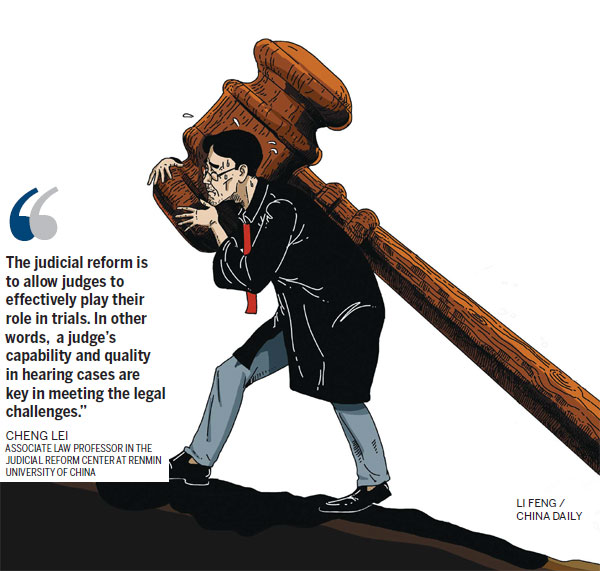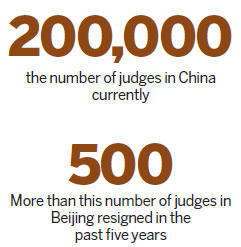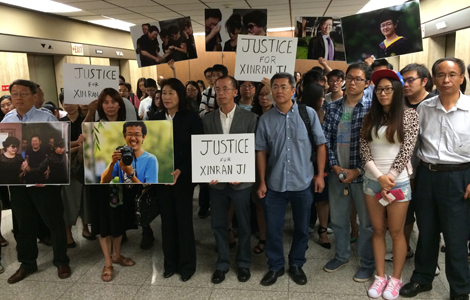Courts court change
Updated: 2014-08-13 07:41
By Cao Yin (China Daily USA)
|
||||||||
Latest judicial reform aims to plug talent drain and improve selection process, reports Cao Yin in Beijing.
After hesitating for a year, Zhang Wei finally decided to return the court the black robe he had worn for 16 years. The 39-year-old former judge resigned from a Beijing suburban court on July 15, citing administrative obstacles in the judicial environment, work pressure and inadequate pay as some of the reasons for giving up the profession he once loved.
Zhang was not alone among the 200,000 judges in China.

The Chinese capital has lost more than 500 judges in the past five years and the number is increasing, statistics released in March by the Beijing High People's Court during the annual "two sessions" of the country's political advisory and legislative bodies showed.
To stem the drain, China's top court has issued a five-year plan. The move is in line with the judicial reform raised by the central government in November, which aims to resolve the legal challenges of recent years such as administrative obstacles in judgments and judges' resignations.
"We want to simplify the process and ensure the quality of the judiciary," said He Xiaorong, director of the judicial reform office with the top court.
Many young judges might be finding it tough to navigate the current judicial environment but the latest reform can provide a better platform for their work and career prospects, he said.
The measures will include addressing how quotas on judges are set and the preference given to seniority in selecting the judiciary, he said.
"In other words, the quota for judges will not be decided based on a judicial member's seniority," He said.
Legal professionals lauded the top court's moves, but some, like Beijing-based lawyer Yi Shenghua, said setting higher thresholds for judges is more crucial to stop the resignations.
Better job recognition and removing obstacles to judgments are also important to prevent those like Zhang Wei from leaving, Yi said.
Work challenges
Zhang became a judge in 2008 after graduating from a law school, passing the requisite civil servant exams and clocking in several years' experience.
He was initially proud of his career and worked with passion, striving to give fair and reasonable verdicts.
"I aimed for dignity and professionalism," Zhang said.
But in the winter of 2011, he met some of his first major problems at work.
Zhang threw out a case involving a 78-year-old man who wanted to get back a house that he sold several years ago in Beijing's Shunyi district because he said the house had some items that he did not want to sell.
He appealed to Zhang's court, but Zhang announced the purchase legal and complete.
"The case application was against legal procedures. The old man shouted at me at the gate of my court for about a month," Zhang said.
Zhang said no one offered to resolve the issue and the litigant even went to his court twice a day to curse him.
Sometimes, similarly disgruntled women also threatened him and pulled at his robe when the court did not accept their appeal in certain cases, he said.
Several weeks before Zhang quit, an elderly litigant also rushed up to him during a hearing and broke his gavel after the judge dismissed the senior's appeal in accordance with the law.
"I knew they weren't familiar with the law, but I couldn't help but feel dishonored and disheartened by such extreme behavior. My salary, at about 5,500 yuan ($900), was also hardly enough to raise my family," Zhang said.
These instances of abuse and lack of respect began to erode his passion for his work, Zhang said.
Another major problem is related to verdicts, Zhang said, as some of his judgments had to be referred to his judicial superiors.
"In other words, I heard a case but was not necessarily expected to give the verdict," he said.
Judicial reform office director He Xiaorong said he was familiar with Zhang's case and told China Daily it was a pity that he finally decided to leave.
"I was sorry to hear that Zhang didn't receive the dignity expected of the job. I know of many judges who have had similar experiences," He said.
Better selection
The judicial reform will improve the treatment and protection of judges, He, from the top court, said. That includes increasing judges' salaries and improving medical benefits and welfare.
A special committee to select judges at the provincial level will also be developed to ensure judicial quality.
Judges will be responsible for the cases that they hear and be required to write the related judicial documents, he said. That means their judgments will not be referred to chief judges or even the president of the court.
"We must avoid such administrative interference with judgments to ensure the independence of judges," He said.
"Senior judicial staff can give different opinions for a controversial case, but their suggestions must be duly recorded.
"If a judicial superior disagrees with a judgment, he or she must provide the explanation on paper. Otherwise, the verdict cannot be changed," He said.
Such suggestions must also be disclosed online for public scrutiny, he said.

It is important to protect younger judges and ensure their professionalism and dignity in their work, he said.
As a crucial part of the reform to improve the selection of the judiciary, the top court also said that judicial officers will be divided into three categories: judges, assistants and administrative staff.
Shanghai, which is hosting a pilot program in the judicial reform, has issued quotas for judicial officials. Judges will take up 33 percent of the number of judicial officials, while assistants will form 52 percent and administrative officers the rest.
"That means about 85 percent of judicial staff, including chief judges and presidents, will be encouraged and engaged in trials. In that case, the number of judges will be able to accommodate the increasing number of cases," He said.
He reiterated that seniority and age will not be major factors in the latest arrangements.
But those like former judge Zhang Wei still expressed concerns that current senior legal officials with administrative titles will occupy more positions in the judiciary, with younger judges and court clerks being squeezed out.
Yao Jianlong, a professor specializing in criminal justice at Shanghai University of Political Science and Law, said that the system cannot be rigid in its selection of the judiciary.
"Judge selection is key in the reform, and the list of suitable people must be updated," Yao said.
"If the selected judges are not qualified, they should make way for others."
Lawyer Yi Shenghua said judge selection must be stricter if the latest quota is implemented and it is urgent for the top court to spell out in detail the requirements for the job.
More than 10 judges, some of whom form the backbone of their courts, have expressed to Yi their desire to quit, he said.
"The number of cases handled in the past three to five years should be used as a major factor in qualifying judges," Yi said.
"Only in this way can those with administrative titles not become judges."
"The selection cannot be too tough. Otherwise, some judges in the grassroots courts will be sacrificed, and our goal to take trial experience as a core criteria will not be realized," he said.
Cheng Lei, an associate law professor in the judicial reform center at Renmin University of China, confirmed that one-third of the current number of judges will be able to stay in their positions after the latest quota is enforced.
"The percentage should be applied on the ground. For instance, the number for Qinghai province in Northwest China must be different from that of developed coastal regions," Cheng said.
Judge selection should be diverse, but placing a certain amount of judges with enough social experience is also necessary, "as judges in the United States and Japan are old and can tackle more than five times the number of cases a year than those in China", he said.
But he also encouraged young judges to be patient. "Their talent will eventually get recognition," he said.
"The judicial reform is to allow judges to effectively play their role in trials."
"In other words, a judge's capability and quality in hearing cases are key in meeting the legal challenges," he said.
Contact the writer at caoyin@chinadaily.com.cn
(China Daily USA 08/13/2014 page7)
Most Viewed
Editor's Picks

|

|

|

|

|

|
Today's Top News
Brazil presidential candidate Campos killed in plane crash
US Marine deployment raises brows
China, global markets spur Priceline deal
More than 1,000 auto firms probed
Chinese fans mourn beloved star
Deng TV series lifts the lid on key years
Futures consultants see future in China
Menlo Park VC invests in China's medical tourism
US Weekly

|

|
















